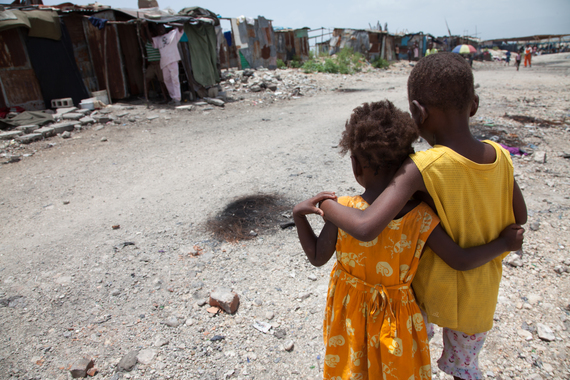Desperately poor and bereft at the death of his wife, Daniel's father made the only choice he could for his six-year-old son. But Daniel, afraid and hungry -- and even lonelier than when his mother died -- hated the orphanage from the first frightening night he cried himself to sleep.
Life in Haiti has never been easy, and the earthquake of 2010 struck a particularly cruel and devastating blow to an already impoverished people. Daniel and his parents managed to survive the first wave of destruction, but in the aftermath, his mother succumbed to cholera, the wasting, waterborne disease that claimed the lives of thousands. With no way to provide for his son without his wife, Daniel's father saw the orphanage as their only hope for the education, health care and safety he could not afford.
Yet no matter what it promised, the orphanage could in no way make up for the loss Daniel has suffered. Now 8 years old, Daniel shares his plight with more than 30,000 other children institutionalized in Haiti, a nation where NGOs including Lumos are working with the government to reduce reliance on orphanages, replacing them with community-based support services that help children stay with their families.
Most "orphans," like Daniel, have parents who live too far away to visit. Some children don't know if their families have survived and wait for word that never comes. Reuniting families under chaotic circumstances is especially difficult and time-consuming. Even under the best of conditions, finding families can take months, even years, and children can slip through the cracks easily. Official records may be missing. For example, birth registration in Haiti is not universal, and families struggling with extreme adversity are less likely than others to obtain birth certificates for their children. This further compounds the complexity in finding those families who need support and reuniting those who have become separated. And 85% of orphanages in Haiti are not registered. So there is no official record of the children who enter or leave.
It doesn't have to be this way, not for Daniel and not for the world's 8 million other children living in orphanages and residential institutions.
Daniel and all children growing up outside of family care share more than loss and loneliness: Research proves that the healthy development of their young brains is at great risk because they are denied the essential emotional connection to a caring adult. The science is clear: when brain development is affected, intellectual, emotional and psychological deficits occur and lead inexorably to adulthoods defined by limits rather than opportunities.
This week, the United Nations is meeting to review a proposed global framework for measures -- indicators -- of progress against the Sustainable Development Goals (SDGs) outlined in Transforming Our World: the 2030 Agenda for Global Action. The Agenda was approved last fall by the General Assembly in New York, to serve as the blueprint for the investment of billions of dollars in foreign assistance.
With children's futures at stake, the indicators set to gauge progress against the goals must be made to work better for children than they do now. Currently, household surveys provide the data used, excluding as many as 8 million children who do not live in families, including children in orphanages. That is why more than 170 organizations from across the globe -- from the American Academy of Pediatrics and Save the Children to the Better Care Network, the European Foundation Centre and Lumos -- have signed a letter urging the UN to:
1.Ensure that all children living outside households and/or without parental care are represented in disaggregated data that is used to inform targeted, appropriate, and accessible interventions to improve living arrangements and caregiving environments, such as access to clean water, food security, access to healthcare and education - key markers for vulnerability, risk and disadvantage.
2.Improve and expand data collection to ensure all children are represented.
3.Expand the use of data to include "third party" data -- that would allow for unofficial but respected data collection methods and the continuing development of strong national level indicators.
Daniel and every other child in harm's way have the right to nurturing family care, education, health care, proper shelter, and the chance to be self-reliant someday -- all the things we would want for our own children.
It may not be too late to change the odds. Counting all children is a good place to start.

